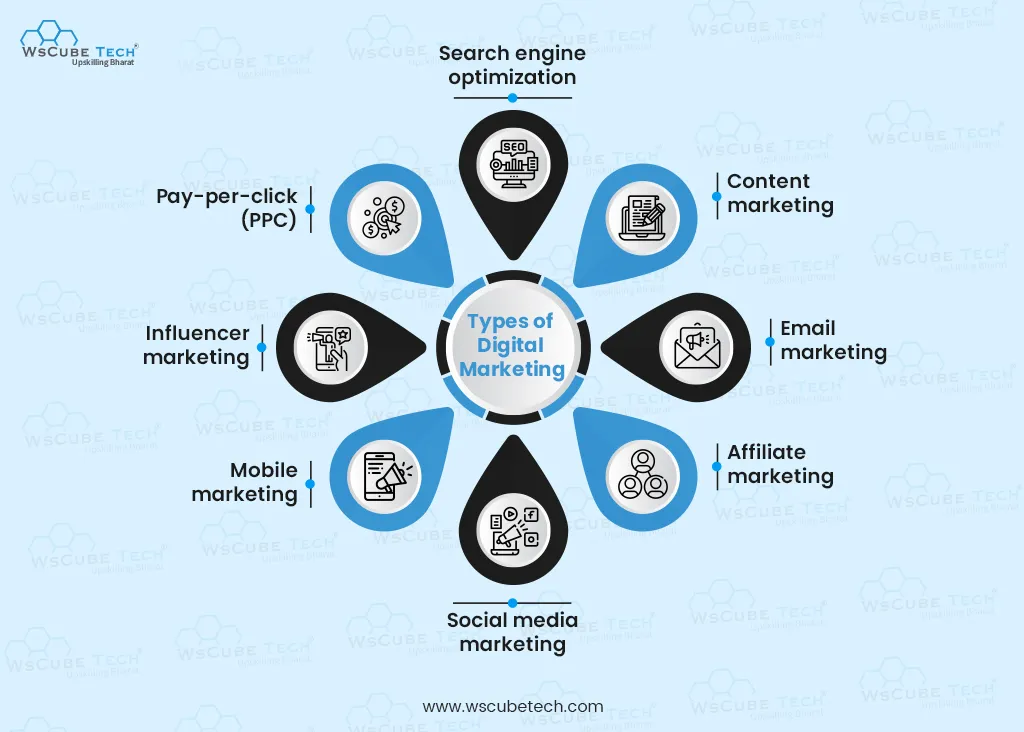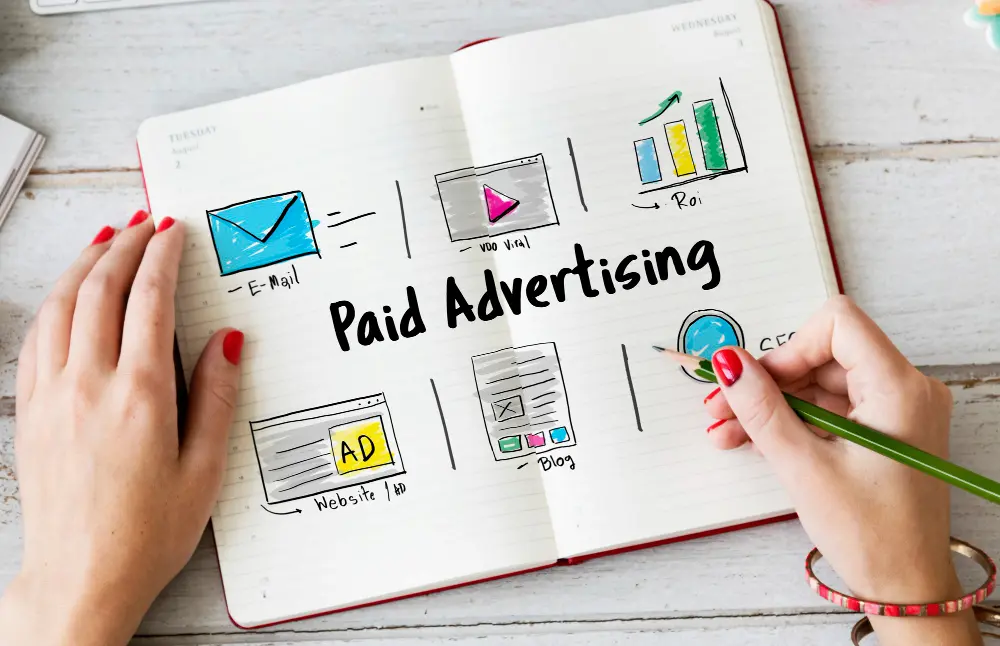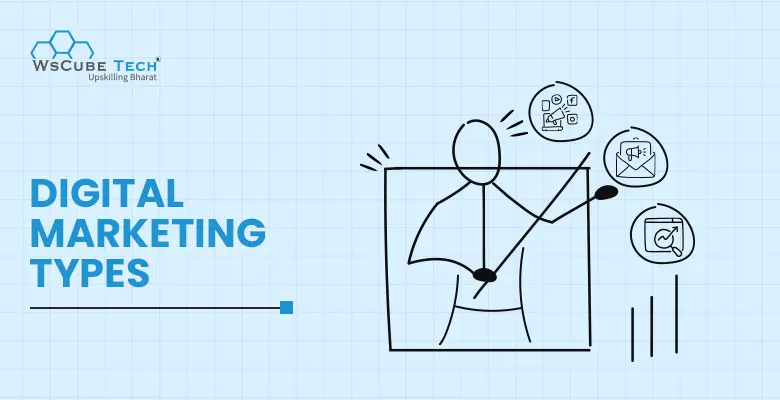We are living in a digital era, where businesses need to have a strong online presence to survive in the industry. With more than 5 billion internet users worldwide, companies have a vast potential base to target. However, to make the most of this, businesses and marketers need to have a fair understanding of the different kinds of digital marketing available.
Digital marketing is taking the modern business world by storm. It is dynamic and volatile, so what was trending a few months ago may not be relevant or useful anymore.
In this blog, we will explore digital marketing and its types, including SEO, SEM, social media, and more.
What is Digital Marketing?
DDigital marketing includes marketing tactics and strategies that use the Internet to connect with potential customers. It is an electronic form of marketing deployed to promote different products and services. Online businesses use different types of digital advertising to improve their brand visibility and reach a wider section of the audience.
Websites, emails, social media, blogs, newsletters, etc., are the most commonly used digital marketing mediums. Whether it’s a small business or a large enterprise, it’s important to utilize digital marketing to stay relevant in the industry. It empowers numerous businesses these days, allowing them to earn higher ROI with little investment.
Digital marketing will continue to evolve in the coming years, so businesses that have still not shifted to digital media must embrace it soon to connect with the audience and establish their brands.

List of Digital Marketing Types
Digital marketers use different platforms and channels to connect with and engage users. With the right medium and strategy, you can reach a larger audience space. Although digital marketing offers multiple strategies, you need to deploy the most relevant one to accelerate your business growth and achieve your marketing objectives.
- Search Engine Optimization (SEO)
- Content Marketing
- Influencer Marketing
- Search Engine Marketing (SEM)
- Pay Per Click Advertising (PPC)
- Social Media Marketing (SMM)
- Affiliate Marketing
- Email Marketing
- Mobile Marketing
- Viral Marketing
Types of Digital Marketing

The following are the 10 digital marketing types, along with their pros and cons.
1. Search Engine Optimization (SEO)
When you open Google and type something, even a simple search yields thousands of results. However, you hardly visit anything beyond the top suggestions. That is why the aim of each website is to attain the top rank on the search engine result page.
Marketers achieve this through search engine optimization (SEO), an online marketing technique to optimize a website and boost its search engine ranking. Considering how crowded the digital space is, SEO experts ensure that the target customers find their websites and web pages online.
Businesses implement different forms of digital marketing techniques through SEO, including on-page SEO, off-page SEO, social media marketing, website optimization, content marketing, etc., to attract more traffic and improve the online visibility of their brand.
It targets organic keywords, so marketers craft content that aligns with their products. SEO is a vast field, and if you want to be an SEO expert, it’s important you join a reliable SEO course and build your skills under professional mentors. A top-notch training program will help you gain hands-on experience and become career-ready within a few months.
Pros
- A cost-efficient marketing technique.
- Enhances brand visibility and organic traffic while supporting content marketing.
Cons
- Heavily relies on content and tech tools.
- Difficult to target certain keywords due to tough competition.
- Demands ample time to make it work.
- Frequent changes in search engine algorithms, so you need to stay updated with the latest trends.
Also read: 10 Free Digital Marketing Projects for Students (Best Ideas 2025)
2. Content Marketing
Content marketing is among the most effective types of internet marketing, where professional writers create valuable and informative content, such as videos, blog posts, copies, and other instructional materials.
Marketers curate fresh and engaging content that Interests the audience with the aim of creating a loyal consumer base. They address their queries and issues, which creates a loyal and regular consumer base. It also generates leads and increases sales.
When users share the content, it drives traffic to the website and expands the network. However, it is crucial to publish the content consistently, keeping the target audience in mind. Make sure that you publish quality content with reliable facts taken from trusted sources.
Although it will demand time and effort, it will help businesses accumulate an audience that trusts the brand. They should come to your website to seek the latest news and updates.
Pros
- Supports other digital marketing techniques.
- Relatively a cost-effective method for small businesses and startups as compared to other digital marketing methods.
- A versatile option to build a brand by entertaining and engaging the users.
- Valuable content can address the concerns of the target audience and build brand credibility.
- Increases lead generation and user engagement.
- Helps websites boost their search engine rankings and drive quality traffic.
Cons
- Creating content that aligns with the target audience is time-consuming.
- Due to fierce competition, composing content that stands out can be challenging.
- Takes a lot of time to rank the target keywords.
- Difficult to measure ROI and determine the effectiveness of the content.
- Demands consistency and quality, which is not always possible for businesses.
3. Influencer Marketing
Influencer marketing refers to the process of promoting products and services by engaging influencers or famous personalities. It is one of the emerging digital marketing methods that involves people with enormous social media following. Businesses hire them as they can make a significant impact on potential buyers and attract them toward the brand.
In simple terms, businesses collaborate with influencers, who serve as their brand ambassadors and share videos, photos, content, or features on their social media handles.
They influence their fans to try a specific product and create awareness about the brand. However, it’s not necessary for businesses to hire celebrities. Smaller brands can also engage social media personalities with loyal followers. If implemented well, influencer marketing can offer a huge scope.
Pros
- Increased brand credibility as known personalities vouch for the products.
- Higher reach because of global fan following of influencers.
- Organic and authentic content.
- Higher user engagement as celebrities share a strong connection with their followers.
- Targets specific demographics.
Cons
- Followers of influencers may not always suit the target audiences of a brand.
- Involves higher costs as celebrities demand high fees.
- Users may not pay much attention to sponsored posts.
- Risk of influencer fraud as many social media influencers have fake followers.
- If the celebrity is involved in any controversy or scam, it can hamper the brand’s reputation.
Also read: 20 Best Digital Marketing Books of All Time (Must Read)
4. Search Engine Marketing (SEM)
Search engine marketing (SEM) is the paid version of SEO, where you pay to get your website rank higher on SERPs. It allows businesses to purchase an ad space to appear on search engines. SEM creates a link between PPC and SEO.
There are several factors that affect the bidding process, such as content, keywords, and quality. Therefore, it’s crucial for marketers to do their research and then enter the ad auction for specific search queries.
Once the search engine finds a website relevant, it can earn a spot on the SERP. It is easy to recognize ads on Google as there is an ‘Ad’ sign at the beginning of the paid URL. The right combination of SEO and SEM can drive website traffic and increase Click-through Rate (CTR).
Pros
- Helps businesses establish a strong brand identity.
- It is a target form of marketing, so you can engage with the potential customers.
- A useful tool for local businesses.
- It’s easier to track and measure results.
- A cost-effective marketing method.
Cons
- Demands constant monitoring.
- Chances of penalty from search engines.
- Requires a lot of time to bid on specific keywords.
- A competitive environment makes it difficult for businesses to get the top rank.
- Internet users often ignore ads.
5. Pay Per Click Advertising (PPC)

Pay-per-click, or PPC, is a digital marketing model that requires advertisers to pay the publisher every time somebody clicks on their ads. The publisher can be a search engine operator, website owner, or social media platform. If done the right way, PPC can generate impressive website traffic and earn quality leads.
Google Ads is the most commonly used PPC marketing platform. Here, marketers bid the maximum amount to pay for each click. You can see these ads on the search engine result page whenever you search for something on Google. To enhance your PPC knowledge and become an expert in the field, take up our Google Ads course now.
Some examples of PPC are social media ads that are displayed in the feed, banner ads that appear on the top or side of a website, or ads shown on search engines when you search for a specific keyword.
Pros
- You just pay for the clicks you get on the ads. So, you don’t actually lose money.
- Helps you rank your website or web page on the top of search engine results, which drives more traffic.
Cons
- Clicks are not usually equal to sales, so ROI is not as expected on the ads.
- You need ample time to set up, monitor, and optimize PPC campaigns.
- It can be an expensive marketing strategy in the long run as you continuously have to pay to stay on top.
- Once you stop bidding or paying, the ranking of your website can tank down.
6. Social Media Marketing (SMM)

If you are learning about digital marketing and its types, you can’t ignore social media marketing. With the rising popularity of social media platforms, businesses are relying on them to promote their products and services across multiple channels.
Social media marketing is considered a crucial marketing strategy, enabling advertisers and companies to promote brands on different platforms and boost traffic to the website. Moreover, it helps generate leads and increase brand awareness.
Create a business profile on a relevant social media platform(s), create posts to promote sales, products, and content, be regular with posts, and if you want, buy ads to reach a wider audience. The social media platform you use may vary depending on your target audience and your product.
For example, Instagram is an ideal platform to reach the audience aged between 25 and 30, while the audience who is 65+ can be reached through Facebook.
Social media overlaps other types of digital marketing, such as PPC, SEO, SEM, and content marketing. To learn social media marketing techniques practically, join our social media marketing course and get hands-on experience in the field before kickstarting your career.
Pros
- Higher conversion rates.
- Allows to reach a larger customer base and communicate with them directly.
- Allows to post more relevant, relatable, personalized, and valuable content.
- You can target specific customer segments and convey brand messages to the right users.
- Access to paid ads to generate more engagement, views, and followers.
- Efforts multiply quickly with more likes, shares, and comments.
Cons
- Demands ample time, money, and effort to create content for different social media platforms.
- Frequent changes in social media algorithms and new formats for content are introduced every now and then.
- It might not give desirable results even with consistent user engagement and retention.
- Requires strategic planning and dedication.

7. Affiliate Marketing
Affiliate marketing is an action-based digital marketing type where an affiliated individual promotes products or services in exchange for a commission. Businesses collaborate with people to promote their brand on their website, social media account, or app, and in return, they get rewards for each visitor or customer who has come through the affiliate’s effort. In short, affiliates promote a brand for a commission.
Affiliate marketers sell products for other businesses and get a commission for each lead generated through their channel. Whenever a user clicks on the link provided by an affiliate to buy a product using the referral link, they earn a commission for that purchase. This helps businesses expand their reach and ensure more organic marketing efforts.
For example, MakeMyTrip has been running an affiliate marketing program as their digital marketing strategy for years. Interested people can collaborate with the company to earn revenue.
Pros
- Starting affiliate marketing doesn’t require much investment and money.
- A chance to generate passive income provided you do it the right way.
- Requires low-cost staff.
- Affiliate marketers can work from anywhere, anytime.
- Earn commissions based on sales.
Cons
- Chances of fraud by merchants and affiliates.
- Fierce competition.
- Dependence on commissions can be frustrating and even lead to low incomes.
- Inconsistent source of income.
- Demands a lot of time to build successful campaigns.
8. Email Marketing
Email marketing refers to sending emails to potential clients to promote a business. Companies can either send newsletters, and users can sign up for them or share regular updates about their products or services. Email marketers are one of the most sought-after types of digital marketers who send emails to hundreds of users to inform them about the latest deals, discounts, sales, and product launches.
The best email marketing campaign is one where businesses gain organic subscribers through their content and not through paid techniques. Users who subscribe on their own are likely to engage more with the brand and stay loyal.
Email marketing is used to get honest feedback from customers and create brand awareness. If used strategically, it generates a higher average return of investment on every dollar invested.
Common examples of email marketing campaigns are blast emails to inform users about upcoming events, timed emails to raise brand awareness during festive or holiday seasons, and targeted emails to share personalized messages to specific audiences.
Pros
- Allows constant connection with the target audience, which strengthens customer relationships.
- Demands low cost but gives higher returns on investments.
- Higher user engagement due to personalized emails and direct communication.
- Independent of any updates in algorithms.
- Convenient to track and measure the effectiveness of email marketing campaigns through analytics.
- Allows to target specific demographics through email list segmentation.
- Automated emails save time and enhance efficiency.
Cons
- Most users don’t even open emails.
- Tough competition for inbox space.
- Email can be spammed.
- Difficult to come up with ways to add value to emails so users don’t unsubscribe.
9. Mobile Marketing

According to Google research, 27% of global users prefer mobile voice search. The mobile consumer journey has witnessed a rapid rise, with the majority of users relying on smartphones for various activities, such as reading news articles, shopping, seeking information on the internet, connecting with people, and more. Moreover, mobiles allow more customer loyalty and work as immediate problem-solving partners.
Therefore, mobile marketing is one of the most popular and mandatory types of online marketing for brands to connect with customers. Businesses now set aside a separate budget solely for mobile marketing to reach the target audience.
So, every marketing campaign must adapt to different screen sizes and devices. Also, texts, messaging apps, and in-app ads must be mobile-specific to yield higher conversion rates.
Pros
- Allows to track how ads are performing.
- A great way to reach a wider section of audience.
- Shows ads in different ways.
- Super-targeted and audience-specific marketing.
- Engaging due to personal devices.
Cons
- It can be expensive.
- Low click rate.
- Too many ads can hamper user experience.
- Smaller space than computers or laptops.
- Some users are not fond of targeted ads.
- Ad-blockers can ruin the campaign.
- Users dislike interruptions while connecting or communicating with friends.
10. Viral Marketing
Suppose you spare no effort to create interesting content that users can’t help but share with friends. What’s next? Millions of people are engaging with that content, and that is when you know that your ad has gone ‘viral’. That’s exactly what viral marketing is.
You spread messages or ads quickly from one person to another using social networks via the internet. Customers share this content related to a specific product or service with their friends and spread the word. This can influence buying decisions and boost brand popularity.
Viral marketing is more suitable for B2C businesses. Although making something go viral is quite easy these days, you need to ensure proper and strategic planning to generate substantial leads.
Pros
- Creates buzz and generates significant interest in a specific product or service.
- Helps reach customers faster and at low costs.
- Engaging and increasing brand awareness.
Cons
- Tough to repeat the viral success each time.
- Low engagement if the content is not unique or interesting.
- It is not a consistent strategy for long-term branding.
- Lack of control over content sharing.
- It can impact brands adversely if the content is offensive.
- The message may not always match with the brand vision.

FAQs about Digital Marketing Types
Digital marketing includes varied channels, each designed to serve a unique purpose. The primary types of channels include search engine optimization (SEO) for improving organic search rankings, pay-per-click (PPC) advertising for driving paid traffic, social media marketing for engagement and brand awareness, email marketing for personalized communication, content marketing to educate and inform audiences, and affiliate marketing to drive sales through partnerships. Understanding these channels helps businesses select the most suitable strategies for their goals.
Each type of digital marketing has a unique effect on consumer behavior. For instance, SEO helps consumers find your business when they’re actively searching for your products or services. PPC advertising can influence immediate buying decisions, especially when targeted precisely. Social media marketing nurtures long-term relationships with consumers, increasing brand loyalty and trust. Email marketing allows businesses to deliver personalized offers, leading to better conversion rates. By understanding how each channel works, businesses can tailor their approach to influence consumer decisions at different stages of the buyer’s journey.
For startups, content marketing and SEO are often the most cost-effective types of digital marketing. Both methods focus on organic growth, which can be achieved without substantial budgets. SEO helps businesses rank on search engines and attract traffic over time, while content marketing provides value through blogs, articles, and videos that engage potential customers. However, combining SEO and content marketing with targeted social media marketing or email marketing can help amplify results without a large investment in paid ads.
For local businesses, local SEO and Google My Business (GMB) optimization are essential types of digital marketing. Local SEO ensures that your business appears in local search results, which is crucial for targeting customers in your geographic area. In addition, social media marketing and PPC ads targeting specific local regions can help build community engagement and drive foot traffic to your physical store. Combined with reviews and testimonials on GMB, these strategies can significantly boost local visibility and sales.
Choosing the right type of digital marketing depends on your business goals, target audience, and resources. SEO is ideal for businesses looking for long-term organic growth, while PPC and social media marketing are great for immediate visibility and traffic. If you have a strong content creation capacity, content marketing can build brand authority and loyalty over time. For businesses that want to focus on personal relationships with customers, email marketing and affiliate marketing might be the best options. Understanding your business’s unique needs will help you identify which marketing types will drive the most value.
Paid digital marketing refers to any strategy that requires payment to promote content or attract traffic. The primary types include PPC (Pay-Per-Click) advertising, which charges businesses each time a user clicks on their ad, typically on search engines or social media platforms. Display ads, which appear as banners or images on websites, and social media ads, where businesses pay to promote posts or run targeted ads on platforms like Facebook, Instagram, or LinkedIn, are also common. Native advertising blends ads into the content on a website, while remarketing targets users who have already interacted with a business online. Each of these paid strategies offers different levels of targeting and engagement.
The best type of digital marketing depends on the target audience, industry, and business type. E-commerce stores selling products directly to customers prefer social media marketing to connect with the potential buyers. Companies selling beauty products or other consumer goods use influencer marketing to influence buying decisions of the audience. However, most companies and marketing teams prefer mixing different marketing types and channels, including email marketing, SEO, content marketing, etc., to promote their products and services and get the attention of users.
Conclusion
Digital marketing offers ample possibilities and options for businesses to connect with their target audiences. Each type of digital marketing method serves a unique purpose and is used for a specific business goal.
Whether you want to boost sales, enhance brand visibility, or drive website traffic, there’s a digital marketing strategy to help you achieve that. All you need to do is stay informed and updated with the market trends and adapt to get an edge over the competition. Tap into your potential with our practical-oriented digital marketing course, specifically designed to meet different learning goals. Acquire the necessary skills and knowledge under the guidance of industry leaders and get one step closer to your dream career.
Read more blogs



